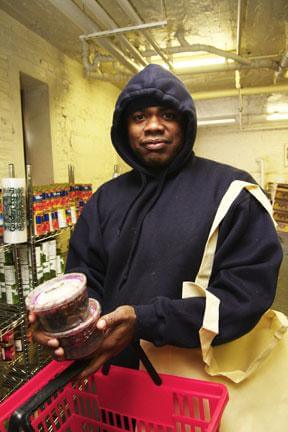by DANIEL BEEKMAN
According to a New York Coalition Against Hunger survey, the Bronx’s food pantries and soup kitchens are falling short of demand and struggling to stay open.
The financial crisis and funding cuts have wounded Bronx providers; 88 percent of the borough’s food pantries and soup kitchens reported longer lines in 2008, while 71 percent rationed handouts and turned hungry people away.
Norah Amat’ullah, executive director of the Muslim Women’s Institute for Research and Development, runs food pantries in Parkchester and Highbridge.
“In Highbridge, we may have to close,” Amat’ullah said. “We may have to close this month. I think 2009 is going to be very rough.”
Open Tuesdays, Thursdays and Fridays, MWIRD serves more than 7,000 people each month. Between November 1 and December 26, nearly 300 households visited Amat’ullah’s food pantries for the first time.
“It wasn’t surprising,” said Amat’ullah. “We saw what was happening with the economy. We were anticipating increased demand. Our problem? Operational funding.”
The Parkchester and Highbridge food pantries operate on $175,000 apiece annually. Food accounts for $130,000, leaving Amat’ullah $45,000 for upkeep, two full-time and four part-time employees, and transportation for a slew of volunteers.
MWIRD, one of 1,000-plus NYC providers, obtains food from the city’s food bank, a non-profit organization. According to a food bank study released December 16, nearly 4 million New Yorkers have trouble buying food – double the number that did in 2003.
On Friday, January 2, Governor David Paterson authorized $1 million of emergency funding for the state’s food banks, soup kitchens and food pantries. The governor’s newest 2009-2010 budget includes a $4.4 million boost for hunger relief organizations.
Joel Berg, executive director of the New York Coalition Against Hunger, isn’t satisfied, however. Of the 308 NYC food pantries and soup kitchens that responded to Berg’s survey, 72 percent reported receiving less government money and food in 2008.
According to Berg, food corporations are donating less.
Meanwhile, Amat’ullah has noticed more working people at MWIRD’s door.
“In the past, we were serving impoverished families,” she said. “Now we’re serving two-income families. Layoffs aren’t the only issue. The price of food has gone up. Your $100 worth of groceries just isn’t the same.”
Sharon Joslyn oversees St. Luke’s Food Pantry in Mott Haven, which opens at Friday 10 a.m. St. Luke’s used to welcome100 households each week. Now Joslyn only has food enough for 80.
“By 7:30 a.m., they’re in line,” she said. “Whereas before we gave according to the size of the family, now we give one bag of food – no matter what. Before the bags had 12 food items. Now ten.”
In Parkchester, Mamadou Cisse is discouraged. Cisse manages MWIRD’s Benedict Avenue Community Food Pantry. A month ago, he served 80-100 people. Now Cisse serves 120-140.
MWIRD has done some private fundraising; it accepted 48,000 pounds of rice in October. Still, Amat’ullah worries her food pantries won’t pull through.
“Donations are great,” Berg said. “But trying to solve this with canned food drives is like trying to fill the Grand Canyon with a teaspoon. Contact your elected officials. Campaign for the [federal] Child Nutrition and WIC Reauthorization bill.”


































